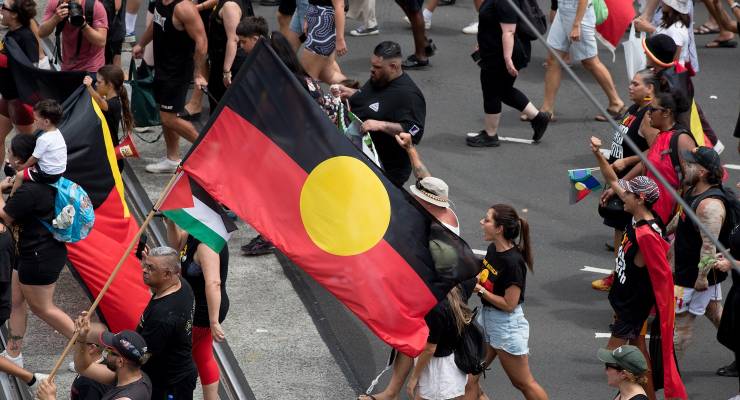
First Nations children’s, housing and health organisations have demanded that governments step up and deliver on the Closing the Gap agreement.
The recent findings of the Productivity Commission’s first three-yearly review paint a stark picture of government inertia and a “failure to grasp” the magnitude of change required.
The review recommends departing from a business-as-usual mindset and instead adopting power-sharing arrangements to acknowledge Aboriginal and Torres Strait Islander people’s perspectives.
Catherine Liddle, chief executive of SNAICC — National Voice for our Children, said the organisation, which represents Indigenous children in out-of-home care, had signed the agreement in 2020 in good faith.
“It’s past time all governments got serious about changing the way they work with Aboriginal and Torres Strait Islander peoples and organisations,” Liddle said.
The recommendations from the review include sharing power, recognising Indigenous data sovereignty, rethinking mainstream systems, and strengthening accountability.
Commissioner Natalie Siegel-Brown emphasised the prevailing issue of successive governments’ failure to recognise the profound shifts necessary to honour their obligations under the agreement.
“The agreement can and should be a blueprint for real reform, but governments will need to move beyond business as usual and address the entrenched attitudes, assumptions and ways of working that are preventing progress,” she said.
The Closing the Gap review underscores a critical sentiment of the need to move beyond rhetoric and address attitudes hindering progress. It advocates for substantial changes in how governments engage with Aboriginal and Torres Strait Islander communities, echoing the agreement’s intent.
Rob Macfarlane, chief executive of the National Aboriginal and Torres Strait Islander Housing Association, said in Victoria alone, the number of Aboriginal women accessing specialist homelessness services increased 20% over the past five years, compared to a nearly 14% decrease over the same period for non-Aboriginal women.
Macfarlane said governments must take immediate and tangible steps to strengthen accountability mechanisms for housing solutions, which requires a radical shift in behaviour and mindset within governments and institutions.
“The First Nations housing sector, with its long-term experience and innovative approaches, holds a unique and essential power in driving sustainable solutions,” he said.
“The gap will widen for our people if attention is not given to addressing the housing emergency faced by our people.”
Victorian Independent Senator Lidia Thorpe said she believed Closing the Gap was a distraction from the real issues.
“And to Close the Gap we need to deal with the fundamental causes of those areas of concern and that is genocide, that is invasion, and that is the ongoing trauma that Aboriginal and Torres Strait Islander people face in this country with incarceration rates, deaths in custody, child removal, destruction of Country, the list goes on,” she said.
— with reporting from AAP.








How do you close the gap if you have two systems?
Indigenous ethno nationalists (yes, it fits the definition) believe there should be separate indigenous systems – a voice, a treaty, a health system, an education system etc
Whatever about a voice or treaty, how can there be a seperate health or education system?
It has to be evidence based. Now I accept evidence based approaches do and should factor in cultural factors but there are limits.
Now there is a separate issue about discrimination and this is where responsible indigenous advocates should focus their attention.
We don’t need new laws to stop deaths in custody. We need the police, the media, the judiciary and governments to be less institutionally racist.
All the more reason for one system. You cannot change the system from without. The voice was always misguided because it encouraged indigenous people to rely on an external and powerless institution. All on the basis that they are somehow different human beings.
While government can do more, this situation reminds me of the 2024 lamb ad….. the divide can only be bridged when the two parties come to agreement. Signing an agreement is token without firm commitment from both parties. One cannot expect all from the other party, we all need to do better.
If you are sick in a remote Australian location . . . you need care. Immediate care.
The question here is: how does compartmentalising our healthcare services according to any ‘self identification with community’ possibly improve the care provision?
The Government needs to change the way it does business.
But it cannot change.
It will not change.
Because we keep voting for it.
So don’t.
It ruins lives without a qualm
and, for me, that has no charm.
I’d rather hear a fire alarm
than politicians spreading harm.
Incorrect. We need delivery (spelt DELIVERY) of health services for each and every Australian – with MINIMAL SCOPE FOR BUCKPASSING, where this delivery fails!
( For the Aboriginal Hands part of this political manifest would give the likes of Dutton, far to much scope to ‘mischief make’. )